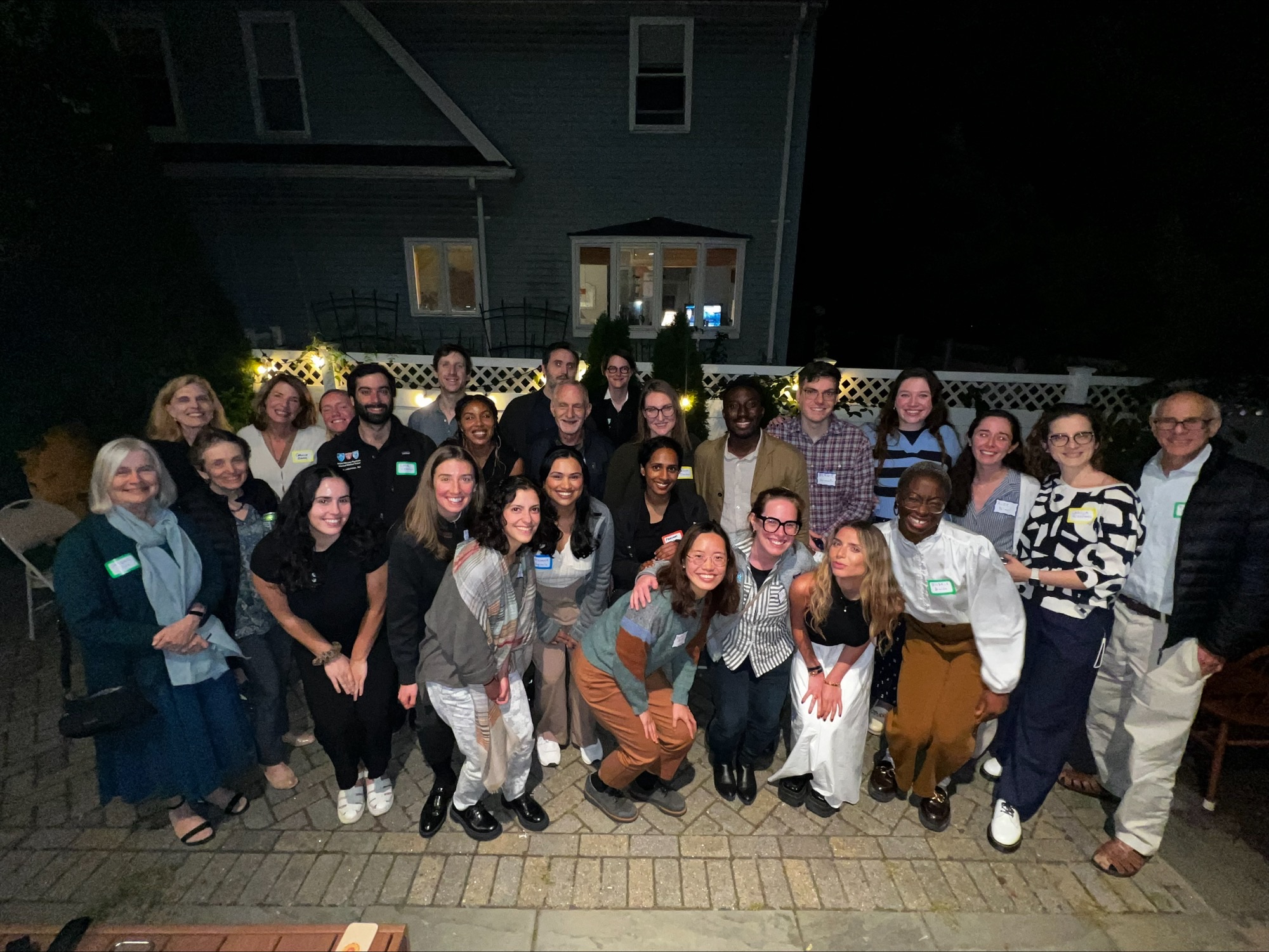Program Mission
 To foster the career development of residents with an interest in psychodynamic psychotherapy, psychoanalysis, and psychodynamic research our program offers a flexible sequence of opportunities for additional academic and clinical pursuits in each of the four years of the residency. In collaboration with the Boston Psychoanalytic Society and Institute (BPSI), the Program in Psychodynamics allows residents to enhance and deepen their psychodynamic interests and to integrate in-depth psychodynamic training and scholarship into the rigorous clinical training provided to all MGH-McLean residents.
To foster the career development of residents with an interest in psychodynamic psychotherapy, psychoanalysis, and psychodynamic research our program offers a flexible sequence of opportunities for additional academic and clinical pursuits in each of the four years of the residency. In collaboration with the Boston Psychoanalytic Society and Institute (BPSI), the Program in Psychodynamics allows residents to enhance and deepen their psychodynamic interests and to integrate in-depth psychodynamic training and scholarship into the rigorous clinical training provided to all MGH-McLean residents.
More Information on PiP Components
More Information about MGH-McLean Residency Program
Program Goals
- Foster the career development of residents who will become leaders in the application of psychodynamic principles to clinical care.
- Help residents acquire skills needed to become scholars/researchers in psychodynamically-related areas of inquiry.
- Mentor residents who want to incorporate psychodynamic expertise in academic careers.
Desired Outcomes of the PIP
- More in-depth experience in psychodynamic psychotherapy.
- Understanding the evidence base for psychodynamic treatments.
- Design and completion of a quantitative or qualitative research project or scholarly clinical paper suitable for national presentation.
- Skills in teaching and supervising psychodynamic clinical work and readiness to embark on further training in psychodynamic research, psychoanalytic psychotherapy, or psychoanalysis.

The PiP offers many educational opportunities (listed below) for residents to learn more about psychodynamics. Residents formally apply to be a Member of the PiP by the end of their PGY2 or beginning of their PGY 3 year. (Exceptions to this deadline may be made on a case by case basis.) PiP Members fulfill the requirements listed below, they enjoy the benefits of PiP Membership, and they receive a PiP certificate at graduation. Residents who are not PiP Members may participate in any of the educational programs (e.g., dinners, video seminar) as Participants.
Requirements
- PiP Monthly Dinners: PiP faculty members host dinners at their homes once monthly. These are opportunities for residents to get to know the faculty and learn more about interesting psychodynamic topics. There are 8 dinners per year. All residents are welcome to attend. PiP Members are expected to attend at least half of these dinners each year.
- PiP Video Seminar: Each year a senior PiP faculty member teaches a seminar for PGY3s and PGY4s in which residents watch and discuss videos of therapy sessions to allow for micro-level analysis of the therapy process. This series is an invaluable way to learn about psychotherapy in particular and clinical work in general. All PGY3s and PGY4s are welcome to attend. PiP Members are expected to attend at least 75% of these sessions.
- Boston Psychoanalytic Society and Institute (BPSI) Fellowship in Psychodynamic Psychotherapy: PGY4s are able to receive advanced training in psychodynamic psychotherapy through the BPSI One-Year Fellowship (https://bpsi.org/training/one-year-fellowship) as a formal part of the resident’s PGY4 curriculum. This program consists of a seminar and small group discussion session that meet weekly on Thursday evenings throughout the year. Interested residents may choose to go on to complete the BPSI 3-year Advanced Training Program or the full multi-year Psychoanalytic Training Program. Applications for the BPSI Fellowship are due at the end of PGY3 year. BPSI One-Year Fellowship is a requirement for PiP Members and the PiP will pay 2/3 of the tuition for Members.
Benefits of Membership

- Mentorship: PiP Members will be assigned a psychodynamically oriented mentor who will oversee the resident’s progress throughout the remainder of residency. Mentors include faculty from MGH, McLean, and BPSI.
- Guest Membership at BPSI: Membership includes access to additional BPSI psychoanalyst mentors, coverage of EXPLO course fees (brief psychodynamic electives at BPSI), BPSI library access and support for the PEP-web (Psychoanalytic Electronic Publishing), and special evening and weekend lectures at BPSI.
- Travel Awards: PiP Members may apply for travel grants to attend the Annual Meetings of the American Psychoanalytic Association and other psychodynamically-oriented conferences.
- Teaching Opportunities: Interested PGY 4 PiP Members may be paired with a faculty member to teach psychotherapy courses offered to junior residents.
- Low-Cost Treatment Referrals: The PiP program directors are available to match residents with affordable psychoanalytically-trained therapists for private treatment. (These referrals are available to all MGH McLean residents.)
Overview of the PiP by Year
 PGY 1 and PGY 2
PGY 1 and PGY 2
- All residents are encouraged to attend PiP dinners and elective seminars when able.
- Residents are welcome to apply to be PiP members in order to work with a clinical mentor, begin a scholarly project, further develop academic interests, etc.
PGY 3 and PGY 4
- Continue attending PiP dinners.
- Attend the PiP Video Seminar in PGY3 year (may attend again and/or make up sessions in PGY4 year).
- Meet with PiP mentor.
- Conduct at least one twice-weekly psychotherapy (strongly recommended).
- Residents are encouraged to consider engaging in the clinical, scholarly, and didactic electives as listed above.
- Members apply to BPSI in January of PGY3 year and complete the BPSI One-Year Fellowship during their PGY4 year.
- PGY3-4 Participants (those who have not applied to be PiP members) are welcome to take part in any of these activities but will not receive a PiP certificate at graduation. Participants who are able to complete the required components of PiP membership but who have not yet applied may contact Drs. Schwartz and Waldinger to determine whether they may still be eligible.

 To foster the career development of residents with an interest in psychodynamic psychotherapy, psychoanalysis, and psychodynamic research our program offers a flexible sequence of opportunities for additional academic and clinical pursuits in each of the four years of the residency. In collaboration with the Boston Psychoanalytic Society and Institute (BPSI), the Program in Psychodynamics allows residents to enhance and deepen their psychodynamic interests and to integrate in-depth psychodynamic training and scholarship into the rigorous clinical training provided to all MGH-McLean residents.
To foster the career development of residents with an interest in psychodynamic psychotherapy, psychoanalysis, and psychodynamic research our program offers a flexible sequence of opportunities for additional academic and clinical pursuits in each of the four years of the residency. In collaboration with the Boston Psychoanalytic Society and Institute (BPSI), the Program in Psychodynamics allows residents to enhance and deepen their psychodynamic interests and to integrate in-depth psychodynamic training and scholarship into the rigorous clinical training provided to all MGH-McLean residents.

 PGY 1 and PGY 2
PGY 1 and PGY 2